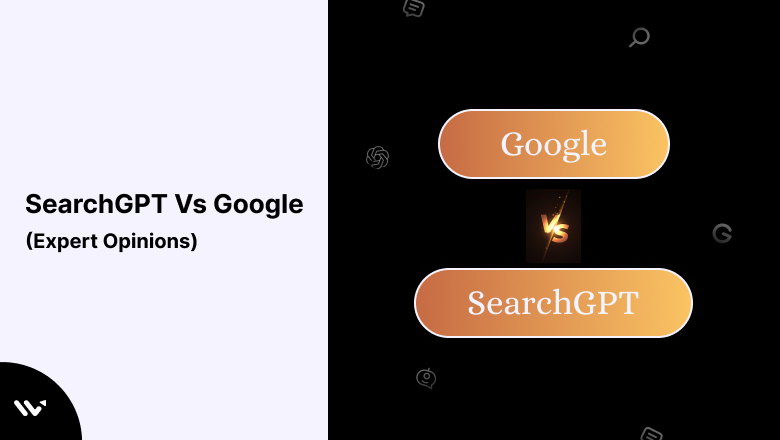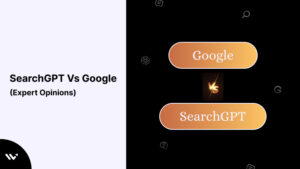In the information age, with AI technologies such as SearchGPT, ever since OpenAI started work on the concept in December 2023, it had the potential to dramatically change how we find and access data.
How content is made and consumed has drastically changed over the past few decades, with each new technology shift significantly altering behaviors, habits, and dependencies.
Pre-Internet Era In the absence of the Internet, information was scarce and access was highly restricted, meaning that individuals had to depend heavily on traditional media like newspapers, books, and broadcasts.
The creators of the content were relatively few, as they mainly comprised paid professional writers and media houses; therefore, the barrier to entry was high, and so was a limitation towards scheduled information.
Build trust & FOMO
Highlight real-time activities like reviews, sales & sign-ups.
After the Internet:
The introduction of the internet meant the democratization of content production and consumption.
Suddenly, everybody was a publisher, and information was much more accessible, dropping reliance on traditional media.
However, that also set off information overload, shifting the problem from access to curation.
After Google:
Information became organized and searchable with Google, thus making the internet truly functional.
It developed in consumers the habit of ‘Googling’ everything, which is behavior representing an expectation for immediate answers with minimal effort.
After social media:
It allowed new dynamics in content interaction; the content became much shorter, more visual, and highly interactive.
Thus, a person could quickly and constantly consume content, which changes the time of attention and increases demands for instant satisfaction.
Now with AI:
We are now moving into a phase where it is not only about finding information through AI technologies like SearchGPT but also understanding and predicting a user’s needs.
In subtle yet profound ways, this signals a shift in consumer behavior from actively searching for information to passively receiving tailored content.
This can lead to what might be termed ‘predictive consumption,’ where the AI predicts and provides content based on past behaviors and inferred preferences.
But what makes SearchGPT a potential game-changer?
We turned to industry experts on LinkedIn and Twitter to get their take on this emerging technology and to understand how it might shift consumer preferences toward quick, precise answers.
Here is an interesting study about ChatGPT: ChatGPT User Growth: Reaching 200 Million Active Users
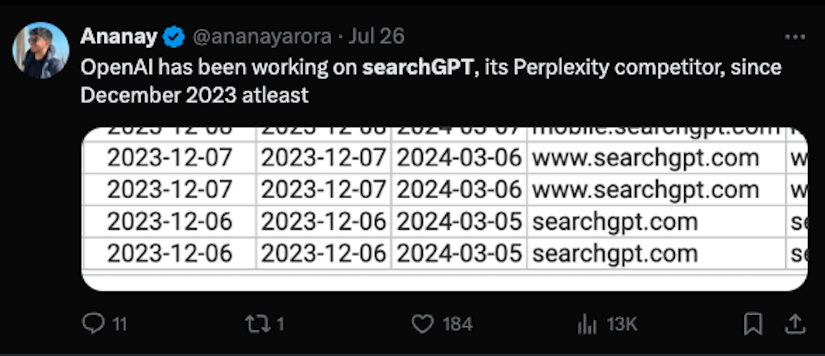
SearchGPT Review
1. What is Search GPT?
Search GPT is OpenAI’s latest innovation, offering users the ability to search for information on the web in real-time through a conversational interface.
Here are some key features:
- Real-time data retrieval from the web.
- Conversational format that allows users to ask follow-up questions.
- Inline citations that link to web sources.
- Streamlined interface, providing clean and simple results.
Use Case Example:
For instance, when asking Search GPT about stock market trends, it provides real-time information with links to relevant articles.
2. What is Perplexity AI?
Perplexity AI is an established search tool that integrates AI with real-time web data and offers some advanced features for researchers and everyday users alike:
- Follow-up question suggestions, enabling deeper exploration of topics.
- Academic-focused searches, allowing users to prioritize results from reputable sources.
- Bulleted responses for quick scanning of information.
- Custom search modes for more targeted queries, such as academic or social-focused searches.
Use Case Example:
When searching for recent papers on hypervelocity stars, Perplexity AI not only provided the papers but also suggested additional related questions, adding depth to the search experience.
3. Head-to-Head: Search GPT vs Perplexity AI
Performance
- Speed: Search GPT is slightly faster in retrieving information, offering near-instant answers to queries. Perplexity AI, though marginally slower, provides smoother output with well-organized formatting.
User Experience
- Search GPT: Offers a clean, simplified interface, perfect for users who want straightforward answers with minimal clutter.
- Perplexity AI: More detailed and feature-rich, especially for users who appreciate bulleted lists and follow-up questions.
Answer Quality
- Search GPT: Ideal for quick answers with relevant citations but sometimes lacks depth in comparison.
- Perplexity AI: Offers more comprehensive responses, often including more detailed explanations and external links to academic papers and news sources.
Additional Features
- Search GPT: Currently lacks advanced search modes (like academic or social focus) but provides concise, reliable answers.
- Perplexity AI: Comes with additional features such as a “Pages” feature, which groups related search results into curated articles.
4. Real-World Testing: Search GPT and Perplexity AI in Action
The video explored several practical use cases for both tools. Here are a few of the queries tested:
- Stock Market Updates: Both tools performed similarly, providing relevant data, but Perplexity AI included more detailed links and additional follow-up questions.
- Polling Information for Elections: Search GPT offered a faster response, but Perplexity gave a more comprehensive answer, including bullet points and external sources.
- Scientific Research (Hypervelocity Stars): Both tools returned research papers, but Perplexity AI’s output was more robust, including additional insights and questions for deeper research.
Viewer Engagement:
The presenter also interacted with the audience by running side-by-side comparisons and encouraging viewers to test queries in the comment section, further highlighting the differences between the tools.
Here’s the full video that dives deep into the real insights from SearchGPT.
Searchgpt Review Insights from Industry Experts
Build trust & FOMO
Highlight real-time activities like reviews, sales & sign-ups.
1. Sam Altman, CEO of OpenAI
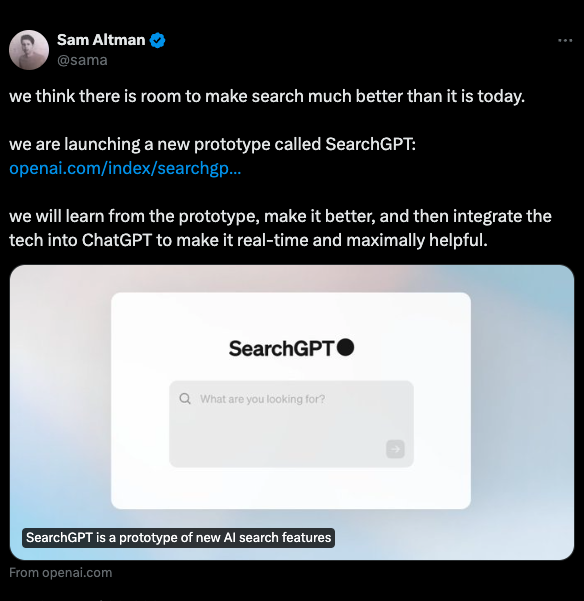
Key Takeaways
-
Room for Improvement: Altman believes there is significant potential to make search better than it currently is.
-
Prototype Launch: Introduction of a new prototype called SearchGPT.
-
Learning and Improvement: The goal is to learn from the prototype, refine it, and enhance its performance.
-
Integration into ChatGPT: Plans to integrate the improved technology into ChatGPT for real-time, maximally helpful responses.
-
Focus on Real-Time Capabilities: Emphasis on making search capabilities real-time to enhance user experience.
2. Neil Patel, Digital Marketing Expert
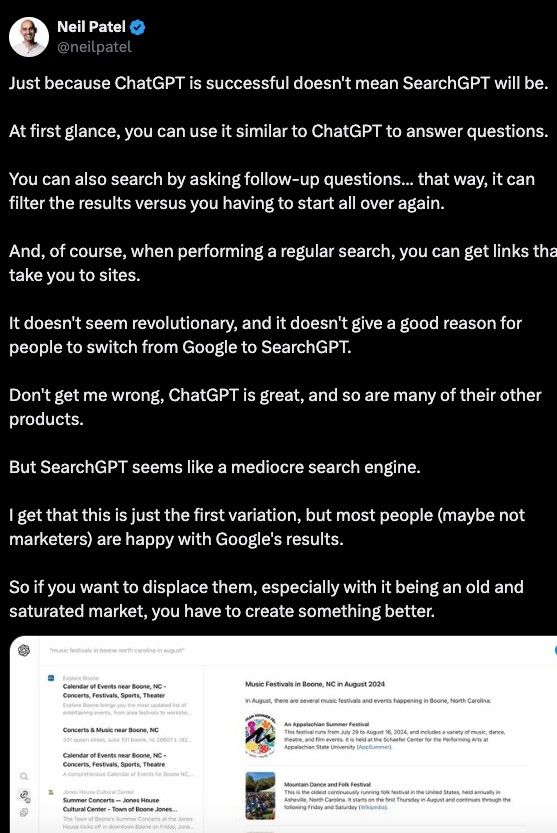
Key Takeaways
-
Comparison to ChatGPT: Patel acknowledges ChatGPT’s success but cautions that it doesn’t guarantee the same for SearchGPT.
-
Functionality: SearchGPT can be used similarly to ChatGPT for answering questions and allows follow-up queries to refine search results.
-
Linking to Sites: Regular searches on SearchGPT provide links to external websites.
-
Lack of Revolutionary Features: Patel finds SearchGPT not revolutionary and sees no strong reason for users to switch from Google.
-
Market Satisfaction: Highlights that most users, especially marketers, are satisfied with Google’s results.
-
Need for Improvement: Emphasizes the need for SearchGPT to be significantly better to displace Google in the saturated search engine market.
-
First Variation: Acknowledges that this is just the first iteration of SearchGPT.
3. Michael Lin, Founder & CEO of Wonders.ai
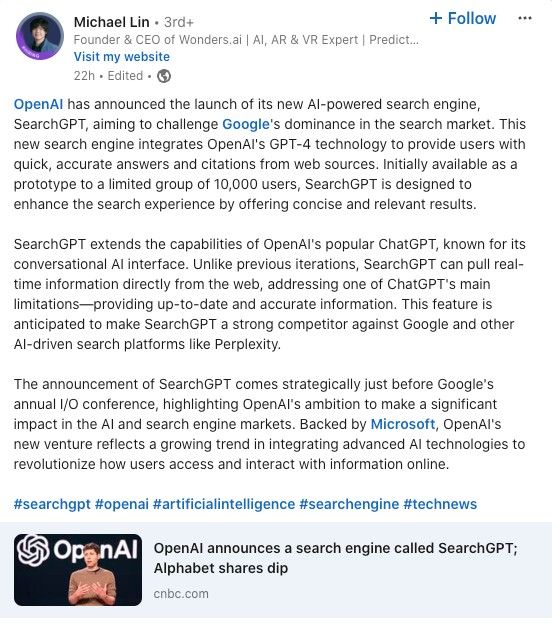
Key Takeaways
-
Launch Announcement: OpenAI introduced SearchGPT, an AI-powered search engine designed to challenge Google’s market dominance.
-
Technology Integration: It utilizes OpenAI’s GPT-4 technology to provide quick and accurate answers with citations from web sources.
-
Prototype Availability: Initially available to a limited group of 10,000 users.
-
Real-Time Information: Unlike previous iterations, SearchGPT can pull real-time information directly from the web.
-
Strong Competitor: Expected to be a strong competitor against Google and other AI-driven search platforms like Perplexity.
-
Strategic Timing: Announced just before Google’s annual I/O conference, emphasizing OpenAI’s ambition to impact the AI and search engine markets.
4. Joe Johnston, Experience Design Director
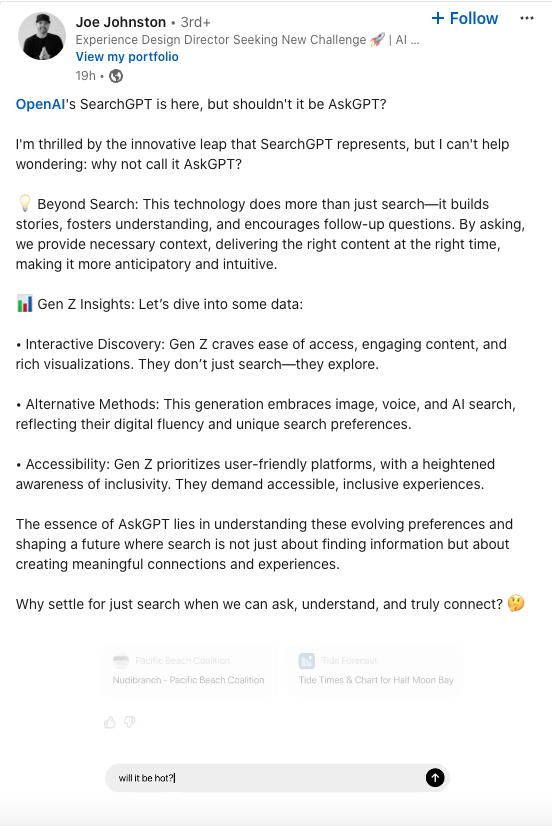
Key Takeaways
-
Name Suggestion: Proposes renaming SearchGPT to AskGPT to better represent its capabilities.
-
Beyond Search: Emphasizes that the technology goes beyond simple search functions by building stories, fostering understanding, and encouraging follow-up questions.
-
Interactive Discovery: Gen Z values ease of access, engaging content, and rich visualizations, preferring to explore rather than just search.
-
Alternative Methods: Gen Z embraces image, voice, and AI search, reflecting their digital fluency and unique preferences.
-
Evolution of Search: Suggests that the future of search involves understanding and connecting with users, aligning with evolving preferences.
5. Alex Northstar, Technology Analyst
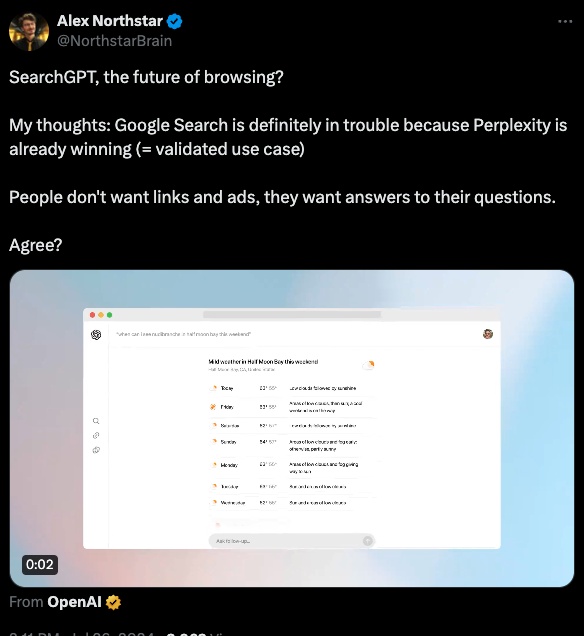
Key Takeaways
-
Potential Future of Browsing: Alex Northstar considers SearchGPT as the future of web browsing.
-
Threat to Google: Believes Google Search could be in trouble due to the success of Perplexity.
-
User Preferences: Highlights that users prefer direct answers to their questions over links and ads.
-
Validated Use Case: Points out that Perplexity’s success validates the user demand for AI-driven answers.
-
Question for Audience: Engages the audience by asking if they agree with his viewpoint.
Build trust & FOMO
Highlight real-time activities like reviews, sales & sign-ups.
The Shift in Consumer Preferences
Today’s consumers expect rapid, reliable information at their fingertips. Traditional search engines, while powerful, often require users to sift through multiple sources to find what they need.
Impact of SearchGPT: SearchGPT, with its advanced AI capabilities, is poised to change this dynamic.
By understanding the context and intent behind queries, SearchGPT can deliver precise answers more quickly than ever before.
Comparison: Unlike traditional search engines that rely on keyword matching, SearchGPT uses machine learning to comprehend the nuances of language.
This allows it to provide more accurate and relevant results, enhancing the overall user experience.
We’re waiting for its official launch to see how it compares to the Google search engine.
Wrap up
In the end, the success of SearchGPT will hinge on how well it caters to the needs and expectations of users.
If it can deliver on its promises of speed, accuracy, and personalization, it has the potential to redefine our relationship with search engines.
We eagerly await its official launch to see if it lives up to the hype and truly becomes the game-changer that many predict.
